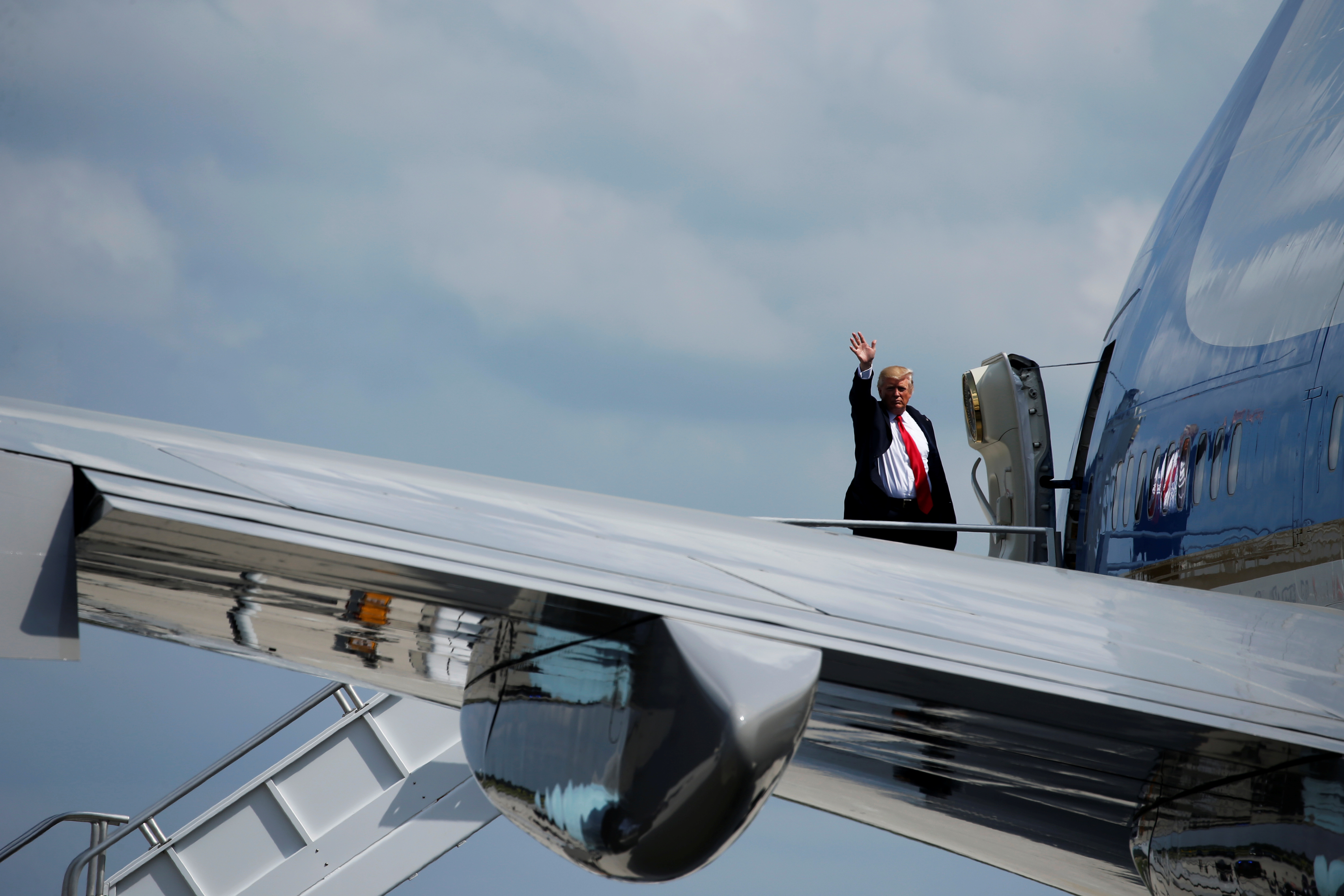How badly will Trump's trip go?
"They're freaking out"


When the president visits foreign countries, his poll numbers often tick up regardless of what actually happens on the trip. Americans see him on the news walking off Air Force One, meeting foreign leaders, being toasted, and generally acting as the embodiment of the United States of America to the world. Much of the time it ends up being a string of photo ops in which the president, cloaked in all the majesty of his office, doesn't need to do much in order to come out looking powerful, commanding, and respected.
But that doesn't happen by accident. It requires extensive planning, the ability to improvise when things don't go right, an understanding of the countries being visited, dexterity with complex diplomacy, and a president able to perform in a variety of settings. As President Trump embarks on his first foreign trip this week, a nine-day whirlwind that will take him to Riyadh, Jerusalem, Bethlehem, the Vatican, Rome, Brussels, and Sicily, do you imagine that he and his staff are up to the task?
We already know that Trump isn't looking forward to it. The New York Times reports that the president "has groused to several friends that he is not looking forward to leaving his new White House cocoon for high-profile, high-pressure meetings with dozens of world leaders in unfamiliar settings," and "at one point, he barked at an aide that he thought his first tour abroad should be only about half as long."
The Week
Escape your echo chamber. Get the facts behind the news, plus analysis from multiple perspectives.

Sign up for The Week's Free Newsletters
From our morning news briefing to a weekly Good News Newsletter, get the best of The Week delivered directly to your inbox.
From our morning news briefing to a weekly Good News Newsletter, get the best of The Week delivered directly to your inbox.
So it isn't hard to imagine that things won't go smoothly — an errant remark that offends his hosts, angry protests against him, or who knows what else. Perhaps the most fraught part of the trip is a speech Trump is scheduled to give in Riyadh, in which he will address the world's Muslims with a discussion of Islam. What could possibly go wrong?
For starters, the speech is being written by Stephen Miller, the former Jeff Sessions aide who has a broad policy portfolio in the White House. Among other things, Miller helped author the administration's ban on travel from several Muslim countries, and is seen as a partner with Stephen Bannon in a long-term project to limit immigration and push back on non-European cultural influences. Miller is hardly alone on this score; Trump's administration is rife with Islamophobes, from Bannon to Sebastian Gorka to the president himself. This has not been lost on the world's Muslims, who may be less than receptive to a lecture from Trump on the past, present, and future of their religion.
Every time Trump goes to a new place or meets a new group of people, there will be new opportunities for him to offend and insult, intentionally or otherwise. While he has little understanding of domestic policy, in foreign policy his cluelessness may be even more encompassing — and of course he has little or no desire to learn what he doesn't already know. He has already displayed a remarkable ability to screw up when relating to foreigners, whether by offending leaders in phone calls or giving up national security secrets to adversaries. And he managed that without even leaving his office.
Meanwhile, foreign leaders are steeling themselves for their meetings with a man they generally consider to be an ignorant halfwit. Officials are preparing for the NATO summit on Thursday by asking the heads of state to limit their remarks to two to four minutes in order to accommodate Trump's propensity to get distracted when people bore him with big words. "It's like they're preparing to deal with a child — someone with a short attention span and mood who has no knowledge of NATO, no interest in in-depth policy issues, nothing," said one NATO insider. "They're freaking out."
A free daily email with the biggest news stories of the day – and the best features from TheWeek.com
That summit happens in the second half of the trip, which could be a dangerous time. As the trip drags on, the chances of Trump going off script in problematic ways will increase. Trump can't stand to sleep anywhere other than his own bed — on the campaign trail he would usually fly home to New York no matter where in the country he was appearing. A week into a marathon of appearances in unfamiliar places and he could get tired, which might make him cranky.
His aides are doing their best to ease his way; when they learned that he would not be able to land his helicopter on the top of Masada (a must on the agenda of any tourist to Israel) but would have to land at the base and take a cable car to the top, like George W. Bush and Bill Clinton had done, they canceled the appearance and the speech he had been scheduled to give there. Since Masada is the site of a famous siege that culminated in mass suicide, Trump's extemporaneous remarks would no doubt have been ... interesting.
Alas, we'll never know what pearls of wisdom he might have pulled from the recesses of his mind on such an occasion. But I'm sure that before this trip is over, we'll have a few more colorful nuggets of Trumpiana to add to the collection of gaffes and stumbles he has accumulated at such a steady pace. Let's just hope the damage isn't too great.
Paul Waldman is a senior writer with The American Prospect magazine and a blogger for The Washington Post. His writing has appeared in dozens of newspapers, magazines, and web sites, and he is the author or co-author of four books on media and politics.
-
 5 editorial cartoons about ICE killing Renee Nicole Good
5 editorial cartoons about ICE killing Renee Nicole GoodCartoons Artists take on ICE training, the Good, bad, ugly, and more
-
 Political cartoons for January 10
Political cartoons for January 10Cartoons Saturday’s political cartoons include a warning shot, a shakedown, and more
-
 Courgette and leek ijeh (Arabic frittata) recipe
Courgette and leek ijeh (Arabic frittata) recipeThe Week Recommends Soft leeks, tender courgette, and fragrant spices make a crisp frittata
-
 Iran cuts internet as protests escalate
Iran cuts internet as protests escalateSpeed Reada Government buildings across the country have been set on fire
-
 US nabs ‘shadow’ tanker claimed by Russia
US nabs ‘shadow’ tanker claimed by RussiaSpeed Read The ship was one of two vessels seized by the US military
-
 How Bulgaria’s government fell amid mass protests
How Bulgaria’s government fell amid mass protestsThe Explainer The country’s prime minister resigned as part of the fallout
-
 Femicide: Italy’s newest crime
Femicide: Italy’s newest crimeThe Explainer Landmark law to criminalise murder of a woman as an ‘act of hatred’ or ‘subjugation’ but critics say Italy is still deeply patriarchal
-
 Brazil’s Bolsonaro behind bars after appeals run out
Brazil’s Bolsonaro behind bars after appeals run outSpeed Read He will serve 27 years in prison
-
 Americans traveling abroad face renewed criticism in the Trump era
Americans traveling abroad face renewed criticism in the Trump eraThe Explainer Some of Trump’s behavior has Americans being questioned
-
 Nigeria confused by Trump invasion threat
Nigeria confused by Trump invasion threatSpeed Read Trump has claimed the country is persecuting Christians
-
 Sanae Takaichi: Japan’s Iron Lady set to be the country’s first woman prime minister
Sanae Takaichi: Japan’s Iron Lady set to be the country’s first woman prime ministerIn the Spotlight Takaichi is a member of Japan’s conservative, nationalist Liberal Democratic Party
